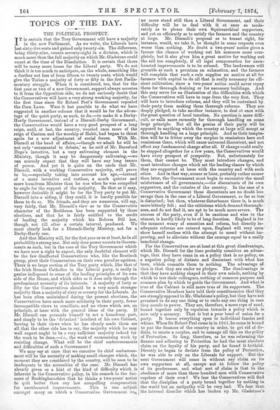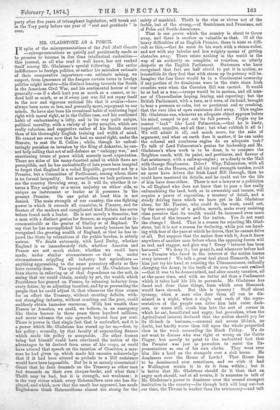TOPICS OF THE DAY.
THE POLITICAL PROSPECT.
IT is certain that the Tory Government will have a majority ' hi the new Parliament. As we write, the Liberals have lost sixty-five seats and gained only twenty-six. The difference, being thirty-nine, counts seventy-eight in a division, which Is much more than the full majority on which Mr. Gladstone could count at the time of the Dissolution. It is certain that there will be many more losses for the Liberal party. We do not think it is too much to anticipate, on the whole, something like a further net loss of from fifteen to twenty seats, which would give the Tories a majority of forty or fifty in the first Parlia- mentary straggle. When it is considered, too, that for the first year or two of a new Government, support always accretes to it from the Opposition side, we do not seriously doubt that the Conservatives will have a very strong working majority, for the first time since Sir Robert Peel's Government repealed the .Corn Laws. Were it but possible to do what we have suggested in another column that it would be for the advan- tage of the quiet party, as such, to do,—to make it a Derby- Hardy Government, instead of a Disraeli-Derby Government, the Conservatives would have a very good prospect of a long reign, until, at last, the country, wearied once more of the reign of Custom and the worship of Habit, had began to thirst again for a new adjustment of social forces. With Mr. Disraeli at the head of affairs,—though we admit he will be not only 'ornamental to debate,' as he said of Mr. Beresford Hope's invective, but a very enlivening element in the Ministry, though it may be dangerously enlivening,—we can scarcely expect that they will have any long tenure of power. And yet it is quite on the cards that Mr. Disraeli, with a working Conservative majority, will prove to be,—especially taking into account his age,—instead of a more inventive and restless, a much quieter and more humdrum Minister than he was when he was compelled to angle for the support of the majority. Be that as it may, however desirable it might be for the Tory party to put Mr. 'Disraeli into a siding, if they could, it is hardly possible for them to do so. His friends, and they are numerous, will say, very fairly, that Mr. Disraeli's view as to the Conservative character of the Residuum has been supported by these 'elections, and that he is fairly entitled to the credit of leading the majority which his Reform Bill has, though not till after a certain interval, produced. We must clearly look for a Disraeli-Derby Ministry, not for a Derby-Hardy one. And that Ministry will, for the first year or so at least, be in all probability a strong one. Not only does power accrete to Govern- ments as such, but in the case of the Tory Government which we have now a right to expect, the only doubtful element will be the few disaffected Conservatives who, like the Bentinok group, pivot their Conservatism on their own peculiar egotism.' There is no large section of the Tory party which, like that of the Irish Roman Catholics in the Liberal party, is really in genius indisposed to some of the leading principles of its own side of the House, and which sides as it does only through the predominant necessity of its interests. ' A majority of forty or fifty for the Conservatives should be a very much stronger majority than a majority of sixty or seventy for the Liberals. As has been often maintained during the present elections, the Conservatives have much more solidarity in their party, fewer incompatible views to conciliate, and no views which are, on principle, at Wine with the general ideas of the party. If Mr. Disraeli can persuade himself to act a humdrum part, and simply to be the 'detached' intellect of his own Cabinet, bowing to their views when he has clearly made them see all that the other side has to say, the majority which he may 'well expect ought to be a very sufficient majority indeed for the work to be done,—i.e., the work of economising work by resisting change. What will be the chief embarrassments and difficulties of such a Government ? We may say at once that we conceive its chief embarrass- ment will be the necessity of making small changes which, the moment they are considered by the country, will be seen to be inadequate to the necessities of the case. Mr. Disraeli has already given us a hint of the kind of difficulty which is inherent in the Conservative policy, in his remark to the far- mers of Buckinghamshire that he thinks a two-years' notice to quit better than any law compelling compensation for unexhausted improvements. This is one subject amongst many on which a Conservative Government can no more stand still than a Liberal Government, and their difficulty will be to deal with it at once so mode- rately as to please their own Squirearchical supporters, and yet so efficiently as to satisfy the fanners and the country at large. Mr. Disraeli's proposal as to tenant right, for instance, would, we take it, be thought in some respects eves worse than nothing. No doubt a two-years' notice gives a. farmer the chance of working out his manures more com- pletely, but it also gives him a great motive for working out the soil too completely, if all legal compensation for unex- hausted improvements is to be refused. The landowners will grumble at such a premium on exhaustion, and the farmers will complain that such a rule supplies no motive at all for farmers with capital to do all that is really necessary for effi- cient cultivation, since a two-years' notice could never repay them for thorough draining or for necessary buildings. And this may serve for an illustration of -the difficulties with which. the Conservatives will have to cope from the very first. They will have to introduce reforms, and they will be restrained by their party from making them thorough reforms. They are deeply pledged, to take another instance, to deal at once with the great question of local taxation. No question is more diffi- cult, or calls more earnestly for thorough handling on some- large principle. But all the genius of their party will be, opposed to anything which the country at large will accept as thorough handling on a large principle. And so their tempta- tion will be to fritter away the surplus in remissions here and remissions there, which will cause universal discontent, and not effect any fundamental change after all. If change could really be stopped altogether for a few years, the Conservatives would have every prospect of prosperity. Bat, unfortunately for them, that cannot be. They must introduce changes, and must introduce changes which set the leading classes by which they are supported at issue with the country and with each other. And in that way, sooner or later, probably rather sooner than later, the Government must begin to encounter the usuall misfortunes of all governments,—the discontents of its own supporters, and the outcries of the country. In the case of a Conservative Government these discontents are no doubt less savage than in the case of a Liberal Government, so far as less is disturbed; but then, whatever disturbance there is, is much more bitterly felt ; and the criticisms which demand thorough- ness, and do not find it, are apt to be much more severe. The success of the party, even if it be cautious and wise to the utmost, is hardly likely to be of long duration. England is for the moment weary of sensation and reform, but directly in- adequate reforms are entered upon, England will very soon' show herself restless with the attempt to mend without im- proving, and to alleviate without the courage equal to a really beneficial change.
For the Conservatives are at least at this great disadvantage, which Mr. Disraeli for- the time probably considers an advan- tage, that they have come in on a policy that is no policy, on a negative policy. of distaste and discontent with what has been, which commits them to nothing. The advantage of that is that they are under no pledges. The disadvantage is that they have nothing shaped in their own minds, nothing by which to test their colleagues, nothing of common purpose and common plan by which to guide the Government. And what is true of the Cabinet is still more true of its supporters. The Conservative Members have told their constituencies that they are strongly opposed to Mr. Gladstone's policy, but they have not promised to do any one thing or to undo any one thing in case they accede to power. They are, therefore, a mere rope of sand, bound together only by repulsion towards a policy which is- now only a memory. That is but a poor bond of union for a party. It leaves everything open to individual fancies and whims. When Sir Robert Peel came in in 1841, he came in bound to put the finances of the country in order, to get rid of de- ficits, to create a surplus, and to manage all this on the-policy of Proteetion. So long, therefore, as he was reforming the finance and adhering to Protection he had the most absolute claim on the loyalty of his party, and he found it faithful. Directly he began to deviate from the policy of Protection, he was able to rely on the Liberals for support. But the next Government will come in without any claim on its own supporters at all, except- not to follow the policy of its predecessor, and what sort of claim is that to the obedience of more than three hundred men with Conservative caprices of their own ? We fear the Conservatives will find that the discipline of a party bound together by nothing in the world but an antipathy will be very bad. We fear that the internal disorder which has broken up Mr. Gladstone's
party after five years of triumphant legislation, will break out in the Tory party before one year of "rest and gratitude" is over.



































 Previous page
Previous page